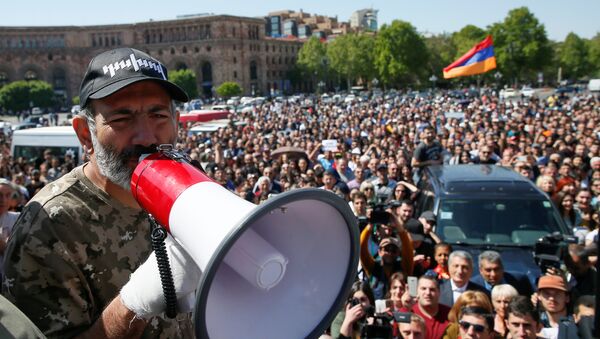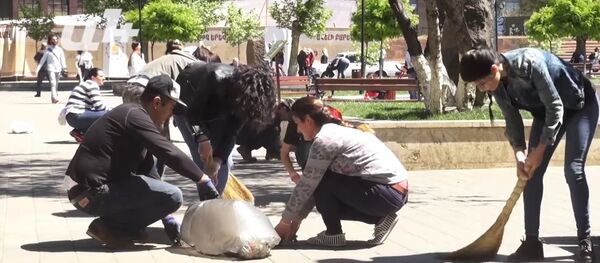Mr. Sargsyan stepped down on Monday but the protesters, many of whom support opposition leader Nikol Pashinyan, have called on the entire Republican Party government to resign.
Mr. Pashinyan claims the government is not addressing the country's economic problems.
Nareg Seferian, an independent researcher in Yerevan, said the mood in the Armenian capital remains "celebratory."
"The opposition has been riding a victorious wave. There were more fears of violence in preceding days, but the police presence has decreased and there are strong indications that the Republican Party will agree to Pashinyan's demands. At the same time, agents-provocateurs or scuffles cannot be ruled out. Things do not change overnight," Mr. Seferian told Sputnik.
'Corruption and a Lack of Legitimacy'
He said people in Armenia frequently complained about corruption and ineptitude.
"Most politicians suffer from lack of legitimacy and credibility. This seemed to be the normal expectation, going well with a lacklustre economy and increasing emigration. The functioning of the judiciary is often questioned. Most citizens feel alienated from the state," Mr. Seferian told Sputnik.
"Serzh Sargsyan trying to effectively take on a third term in office (a foregone conclusion in most circles) pushed the limit and brought people out onto the streets at an unprecedented scale. One refrain that has been making the rounds very often is that the people of Armenia wish to live a dignified life in a country with justice and rule of law," Mr. Seferian told Sputnik.
Since April 13 Yerevan has been hit by a series of protests against Sargsyan's candidacy for premiership.
Before the appointment, Mr. Sargsyan served two five-year consecutive terms as president until April 9.
His election as prime minister had been largely regarded as an attempt to get around presidential term limits, since the 2015 constitutional amendments transferred governing powers from the president to the prime minister.
'Velvet Revolution'
Mr. Seferian believes this week's "velvet revolution" will not lead to any rapid changes in Armenia.
"I am very cautious when it comes to revolutions. The situation remains fragile. Pashinyan is riding a wave of popularity, but does his party have the infrastructure to form a government? In my opinion, everything comes down to political culture. If this movement manages to bring about a positive shift in the political culture of Armenia such that it moves towards more inclusiveness and accountability, then it would indeed be a real victory for the country. But that is the work of at least one generation," Mr. Seferian told Sputnik.
Armenia remains on a war footing with Azerbaijan over the disputed region of Nagorno-Karabakh and clashes between the two sides broke out last year.
Relations between Armenia and another neighbor, Turkey, remain poor for a variety of historical and political reasons and last month President Sargsyan annulled the protocol signed between the two countries in 2009.
The views of the speaker do not necessarily reflect those of Sputnik.



